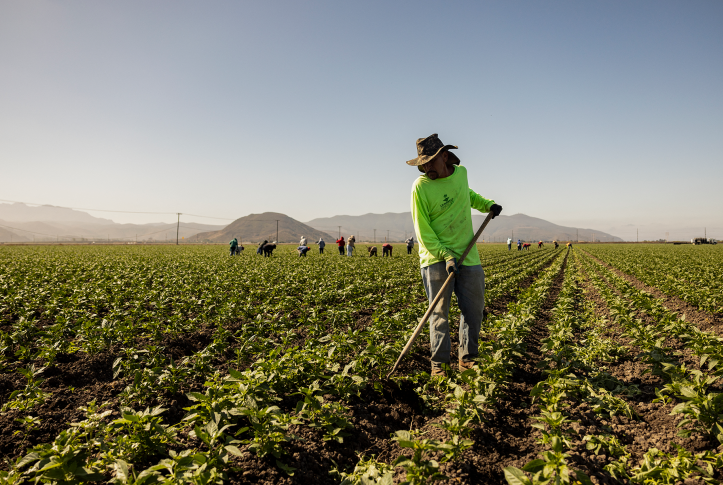Climate change threatens to upend worker safety and health. A growing evidence base shows that people who work in jobs affected by climate change are at high risk of adverse health outcomes. Higher temperatures, for example, put outdoor workers at an increased risk of heat exhaustion, while air pollution and wildfires risk exposure to poor air quality that can result in respiratory illness, mental health issues, and exacerbated chronic conditions.
Noncitizens, who account for nearly one of 10 workers in the U.S., are at a disproportionate risk of exposure to climate-related health risks.1 They are more likely than those born in the United States to work jobs where they are exposed to climate risks, such as agriculture and construction. Six of 10 noncitizens work in jobs with these increased risks, compared to four of 10 people born in the U.S.
Workplace Protections May Not Safeguard Noncitizen Workers
There has been some movement toward protecting workers facing the risks of climate change, including ramped up Occupational Safety and Health Administration enforcement of heat-related violations and a proposed rule to establish a federal heat standard to help protect people at work. Some states have already implemented their own standards to protect workers exposed to heat.
However, absent from these conversations is a robust discussion of how to enact protections in ways that consider noncitizen workers’ unique experiences. Noncitizen workers are especially susceptible to workplace safety violations, which places them at higher risk than U.S.-born workers of experiencing workplace injuries and fatalities. Noncitizen workers may be unaware of or forced to ignore their rights in the workplace, such as the right to breaks, and may hesitate to report workplace violations because of deportation concerns or worries about jeopardizing their future immigration or citizenship status. Language barriers also make it challenging to access and understand workplace safety trainings and other guidance.
Health Access Challenges
Access to quality health care is also critical for dealing with climate change–related health risks. However, noncitizens face significant barriers accessing care. Some lack access to employer-sponsored health insurance because they are more likely to work for employers that don’t offer this benefit (e.g., construction). In addition, federal restrictions may make them ineligible for public health insurance programs like Medicaid and marketplace coverage through the Affordable Care Act. These factors restrict noncitizens’ options for health insurance coverage, which likely contributes to their higher uninsured rates. Nearly four of 10 noncitizen adults ages 18 to 64 are uninsured, compared to about one of 10 among all adults in the same age range in the U.S.
Further, noncitizens may face challenges accessing health care services because of limited access to multilingual and culturally responsive health care providers and staff. Some, especially undocumented individuals, may also hesitate to access health care because of fear of encountering immigration authorities or because of prior experiences of discrimination in health care settings.
Looking Forward
Holes in current workplace protections, coupled with health care access barriers, threaten to limit noncitizens’ ability to weather the disproportionate impacts of exposure to climate risks at work. We need to expand and enforce existing federal worker protections to mitigate occupational health risks, especially as climate and environmental factors increase the strain on workers’ health. Developing these protections will require working with immigrant communities to ensure noncitizens feel safe reporting workplace violations and that there are no negative repercussions for workers who do report violations. Informing noncitizens about their rights and protections in culturally and linguistically effective ways will be key.
Addressing other structural inequities, including barriers to health care and health insurance, could help address health issues from climate change. Already, several states have begun to expand access to Medicaid and the Children’s Health Insurance Program to some income-eligible noncitizens regardless of status. Ensuring noncitizens can access the health care system will be critical to mitigating negative health impacts.




